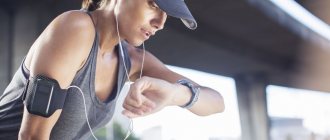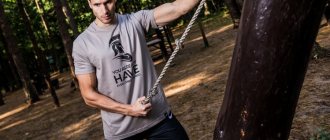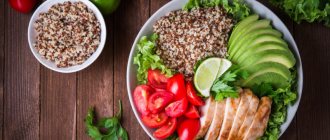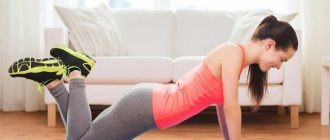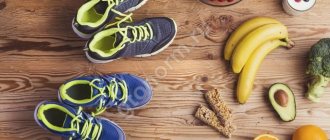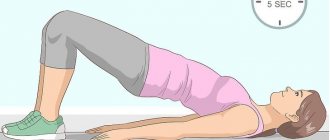Well-known trainer and nutritionist Russell Bateman, fitness trainer Evgeny Shorokhov and many others agree that training on a full stomach is harmful and even dangerous to health.
A period of time is required between meals and classes, which depends on what exactly was on the menu.
It's time to figure out how long after eating you can effectively and safely exercise.
What happens to the body after eating
After eating, the “mood” hormone, serotonin, appears in the body. It participates in metabolic processes, affects blood clotting, normalizes sleep and rest, and slows down the aging process. It also causes some drowsiness.
A feeling of fatigue also sets in, as the body spends a lot of energy digesting food for some time.
And when a person is hungry, the brain produces orexins. This substance does not allow a person to sleep, but forces him to go in search of food. After eating, orexins do not enter the bloodstream, and the person begins to feel sleepy.
Be sure to check out: Simple recommendations from famous trainers on what to eat before a workout to lose weight What to eat before a workout: recommendations from experts What is the best thing to eat after strength training and cardio to burn fat What and how long can you eat after a workout
Is it possible to exercise if you have just eaten?
Coach Daria Zhichkina says that under no circumstances should you train on a full stomach. The blissful state after eating in itself makes a person relax and rest a little. The training will not have the desired effect. And the digestive process will be disrupted, and exercise will not lead to anything good.
Exercise slows down digestion if done immediately after eating. The body requires strength and blood flow to digest, but it has to share with the muscles.
Interesting! In a calm state, only one-fifth of the total blood volume passes through the muscles, and during exercise the volume increases many times over.
When blood is redirected to the muscles during exercise on a full stomach, people feel unwell and others may experience cramps. And in some sports, an overfilled stomach is also dangerous. For example, in swimming, rock climbing.
Rules and intervals of nutrition during physical activity
Professional fitness trainer Evgeny Shorokhov offers several diet options and time intervals between classes.
How much time to eat before training depends on what kind of goal the person is pursuing. When reducing the percentage of fat and muscle tissue you need to:
- Three to four hours before exercise, eat vegetables, drink juice, and avoid protein foods.
- 40 minutes before class you can indulge in sweet tea, coffee, cocoa, and eat fruit.
- Three hours after class, stop eating altogether.
- You need to eat 5-6 times a day.
- When the training took place in the first half of the day, for 10 hours you can only allow yourself fruits and vegetables.
- For lunch, eat protein foods and fats.
- In the afternoon - fruits, dried fruits, in the evening, to lose weight - vegetable proteins and vegetables.
Well-known fitness trainer Anita Lutsenko is convinced that no starvation diets will help if you set a course for slimness. You need to eat right:
- It is better to eat food one and a half to two hours before training, and then eat an hour and a half after training.
- Before training, the best food will be carbohydrate (it is easily digested and gives strength), and after training - protein.
When to eat and exercise to lose weight
The rules for eating for weight loss, according to trainer Evgeniy Sholokhov, are as follows:
- You need to eat five hours before training, fully provide yourself with the norm of proteins, vitamins and fiber, and you can drink as much water as you like.
- Half an hour before class, drink juice or another sweet drink, and eat 200 grams of fruit.
- 2 hours after training, eat 100 grams of protein, for example, low-fat cottage cheese.
- In the case of an evening workout, you need to eat some fruit and milk in the evening. And don’t overeat, because at night food is absorbed faster and fat is stored.
With this approach, the thickness of the skin folds will decrease and the figure will become toned.
How long before weight training in the gym should you eat?
You need to eat a couple of hours before strength training. During this time, protein food has time to be digested. Protein-carbohydrate foods require 3-4 hours to digest. But this is an average.
If a person eats fractionally and in small doses, you can eat an hour and a half before exercise, but when you have to eat three times a day and eat heavily, it will take 3-4 hours.
Should I pause before cardio training?
Cardio training lasts no more than 30 minutes, with heart rate increasing up to 150 beats per minute during exercise. At this time, active breakdown of fat occurs. After exercise, the body will restore them either through food or through subcutaneous fat.
To avoid ravenous hunger, you need to eat an hour before class. The menu should consist of easily digestible proteins - cottage cheese, milk. They will supply the body with the necessary amino acids. And also carbohydrates, which will provide full energy.
Attention! With high-intensity cardio, carbohydrates will interfere; such exercises are recommended to be done on an empty stomach.
Should you have breakfast before exercise?
Before exercising, you need to have breakfast, this will give you strength. When you have a strong desire to eat, especially after waking up, you need to allow yourself to do so. Will not damage fruits and dried fruits. It will take no more than 20 minutes to digest them in the stomach. And then you can start doing exercises, without fear of the consequences. Read more about breakfast before training.
Pre-workout nutrition: to eat or not to eat
All people who go to the gym strive to have a toned body, but not everyone is happy with the result. Efficiency depends not only on the training itself, but also on the diet. Experts do not advise doing any exercise after eating. You must wait at least 40 minutes for the food to digest.
Mode Basics
The basis of the sports diet is:
- Carbohydrates. Necessary to maintain sugar levels. Must be complex (pasta made from durum wheat, cereals) and have a low glycemic index.
- Squirrels. Maintain the normal state of muscles and ensure their regeneration.
- Vegetable fats. Normalize metabolic processes.
After breakfast you can go to training, but you need to wait at least 1 hour. In this case, the menu should be light: oatmeal or buckwheat porridge, fruit, juice or cocoa.
Features of nutrition before training at different times of the day: morning, afternoon and evening
Trainer and nutritionist Russell Bateman believes that consuming fructose before exercise is not the best solution. That is, no bananas and cola.
The ideal pre-workout snack is organic coffee, coconut oil and 5 almonds. And a complete breakfast in the morning, in order to lose weight, should contain proteins in the form of eggs, salmon or meat.
During the day, you can add fermented foods obtained during fermentation to your diet:
- sauerkraut;
- kefir;
- salted cucumbers;
- products with probiotics.
They enhance the effect of physical activity.
And in the evening you can indulge in meat or fish with vegetables. But 2-3 hours before classes. After training it would be nice to take a walk. And go to bed no later than 10 pm.
You may also be interested in: Fitness nutrition: training, losing weight, enjoying food
How soon can you eat after training?
When is the best time to exercise before and after meals?
a man eats a vegetable salad after a workout.
Consider your diet and the type of sport you do.
- If you prefer to eat heavily 3 times, then keep the interval before class as long as possible. Focus on your feelings - the absence of heaviness in the stomach indicates the absorption of food and future comfort from the workout.
- For an adherent of small and frequent meals, a 1.5 hour break before starting physical activity is enough.
After training, if you are not involved in bodybuilding, eat within 20 minutes. This time is called the anabolic window, when all food that enters the stomach is digested quickly and without harm to the figure. Of course, we are not talking about fatty foods and fast food.
So, we looked at the features of eating before and after training so that the latter has the maximum effect on your body, well-being and mood.
Be healthy, eat right and enjoy the activities you love!
Main conclusions
Exercising immediately after eating is harmful and does not make sense for losing weight and getting in shape; you should wait a while.
Reasons why you should not eat immediately before training:
- after eating, the body produces special hormones that relax and put you to sleep;
- The body spends a lot of energy on digestion; it takes time for the influx of new energy;
- the body cannot simultaneously efficiently perform two functions: digestion and movement.
If you wait the required interval from 20 minutes to 2-3 hours after eating, then the efforts from exercise will give an excellent result in the form of a beautiful and toned figure.
What's the best thing to eat before a workout?
Effective training requires strength, which the body receives from food. Before your workout, you can have a light snack to boost your energy.
Nutrition rules before strength training
You cannot eat 10 minutes before starting physical exercise, and it is not recommended to start exercising while feeling hungry. An athlete may faint in the gym or get injured because strength training requires a lot of energy.
Eat before exercising, even if your goal is to lose weight. To lose weight, you need to reduce your intake of carbohydrate-containing foods. It is recommended to include complex carbohydrates in your diet, but in small quantities. The basis of nutrition should be light food:
- vegetables;
- boiled fish and poultry;
- vegetable smoothies.
Protein should be consumed in moderation. When calculating calories, you need to take into account that the energy from the food consumed should be slightly lacking. In this case, the body will have to use up its fat reserves.
If you don't have time for a balanced meal, you can have a snack. The following express refills are suitable for this:
- fruit smoothies;
- yogurt (homemade is best);
- fermented baked milk or kefir with added bran;
- bananas, grapes.
A cereal bar is well suited for such a snack, as it is convenient to carry with you. But it is best to make homemade preparations, because it is much healthier than ready-made store-bought food.
Nutrition rules before cardio training
It is recommended to consume amino acids before cardio exercise. They can be in the form of tablets or protein products. In this case, 1-2 proteins or 20 g of whey protein will do. This diet is suitable for people who exercise in the morning and are slightly overweight. Losing weight is not the goal of such training, so you can eat protein, which will give you a boost of energy and prevent your muscles from breaking down from intense exercise.
People who exercise during the day or evening are advised to have a protein or slow carbohydrate snack a couple of hours before. These products on the menu can be combined or alternated.
The menu may consist of the following products:
- Meat (boiled, without skin and fat).
- Eggs (no more than 2 pieces per day). It is better to give preference to proteins.
- Fermented milk products (low-fat yogurt, kefir, cottage cheese).
- Porridge (oatmeal, buckwheat, wheat, brown rice).
- Whole wheat bread.
- Vegetables (fresh, stewed, steamed).
Nutrition rules before yoga or Pilates
After eating, at least 2 hours should pass before starting to practice breathing techniques. If you feel hungry or weak, you need to have a light snack.
Foods you can eat before class:
- Avocado. Easily digested and gives a feeling of fullness.
- Bananas. Prevents stomach problems and muscle spasms.
- Fruit smoothies. They saturate the body with nutrients and provide it with fluid. You can use low-fat yogurt with fruit.
- Apples. They reduce stomach acidity and supply energy thanks to the vitamin C they contain.
- Yogurt. Can be eaten as a separate dish, you can add fruit or oatmeal.
- Almond. It is enough to eat a few nuts. You can pre-soak them in water for better absorption.
- Raisin. Provides the body with energy due to its natural sugar content.
- Nut bars and dried fruits. Should not contain more than 300 calories.
- Berries. Rich in antioxidants and fiber.
- Cereals. Easily digested and creates a feeling of satiety.
Before breathing exercises, you should not drink a lot of liquid.


